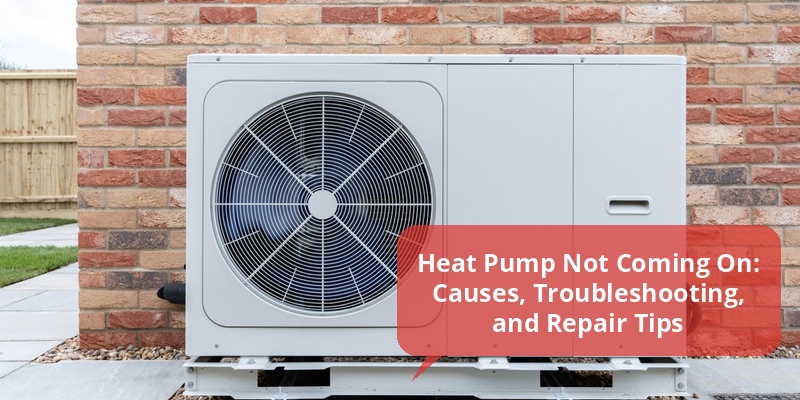A heat pump not coming on can be frustrating, especially during colder months when reliable heating is essential. This common issue can arise from multiple causes ranging from electrical problems to thermostat malfunctions. Identifying the root cause quickly ensures timely repairs and restores comfort efficiently. This article explores key reasons why a heat pump might fail to start and offers detailed troubleshooting and repair guidance for homeowners and HVAC professionals.
| Common Causes | Troubleshooting Steps | Repair Solutions |
|---|---|---|
| Thermostat Issues | Check thermostat settings and batteries | Reset or replace thermostat |
| Power Supply Problems | Inspect circuit breakers and fuses | Reset breakers or replace fuses |
| Frozen Outdoor Unit | Look for ice buildup on the outdoor coil | Defrost unit and improve airflow |
| Compressor or Contactor Failure | Listen for unusual noises or no sounds at all | Repair or replace compressor/contactor |
| Clogged Air Filters | Inspect and clean or replace air filters | Regular filter maintenance |
Understanding Why a Heat Pump Fails to Start
A heat pump’s failure to activate can originate from electrical, mechanical, or control system issues. The heat pump relies on proper thermostat signals, steady power supply, and well-maintained components. When any of these systems falter, the unit may fail to turn on. This section highlights common causes that prevent heat pumps from powering up as expected.
Thermostat Malfunctions
The thermostat commands a heat pump to turn on when warming is needed. Common thermostat problems include incorrect settings, dead batteries, or faulty wiring. If the thermostat does not send the proper signals, the heat pump will remain off.
Electrical Supply Interruptions
Heat pumps depend on a continuous electrical supply. Tripped circuit breakers, blown fuses, or disconnected wiring often cause power interruptions. Homeowners may overlook breaker trips triggered by power surges or short circuits affecting the heat pump.
Frozen Outdoor Unit
During cold weather, frost can accumulate on the outdoor unit’s coil and fan, causing operational failure. A frozen coil restricts airflow and prevents the heat pump from turning on, which requires immediate attention to prevent damage.
Step-by-Step Troubleshooting If Your Heat Pump Does Not Turn On
Systematically following troubleshooting steps can help pinpoint the underlying problem and determine whether a DIY fix or professional service is necessary.
Verify Thermostat Settings and Operation
- Ensure the thermostat is set to “heat” mode and the temperature is higher than the current room temperature.
- Replace thermostat batteries if applicable and reset the device.
- Confirm thermostat wiring connections are secure and intact.
Inspect Electrical Components
- Check circuit breakers in the electrical panel and reset any tripped breaker.
- Replace any blown fuses protecting the heat pump circuit.
- Look for signs of burnt or loose electrical wires near the heat pump system.
Examine the Outdoor Unit
- Look for visible ice accumulation on the coils and fan blades.
- Clear debris and ensure adequate airflow around the unit.
- If frozen, turn the heat pump off and allow it to defrost completely before restarting.
Check Air Filters and Vents
- Dirty air filters reduce airflow, potentially causing the system not to engage properly.
- Clean or replace filters per manufacturer recommendations—typically every 1 to 3 months.
- Ensure all supply and return vents are unobstructed.
Common Repair Solutions for a Heat Pump Not Turning On
Appropriate repair strategies improve heat pump reliability and extend equipment lifespan.
Thermostat Replacement or Calibration
If a thermostat is unresponsive or malfunctioning, replacing it with a modern, programmable unit can optimize heating performance. Professional calibration may also be required for precise temperature control.
Electrical Repairs
Resetting tripped breakers or replacing blown fuses can resolve power supply issues. For damaged wiring and faulty contactors, consulting a licensed electrician is essential to ensure safe and compliant repairs.
Defrosting and Outdoor Unit Maintenance
Regularly clearing ice buildup prevents heat pump shutdowns. Installing a defrost control system and improving unit airflow by trimming surrounding foliage can reduce freeze occurrences.
Component Replacement
Worn compressors, capacitors, or contactors should be repaired or replaced promptly. These components are crucial for starting and running the heat pump motor efficiently.
Scheduled Maintenance
Regular professional inspections and maintenance can prevent many causes of heat pump failure to start. Typical service includes cleaning coils, checking refrigerant levels, lubricating motors, and ensuring all electrical parts are functioning correctly.
Preventative Tips to Reduce Heat Pump Startup Issues
- Replace air filters regularly to maintain proper airflow and system efficiency.
- Inspect and clear debris around the outdoor unit to prevent freeze-ups and airflow restrictions.
- Schedule annual professional maintenance before the heating season begins.
- Use a programmable thermostat to optimize heating schedules and detect thermostat failures early.
- Ensure electrical components are inspected to avoid sudden system shutdowns due to power issues.
